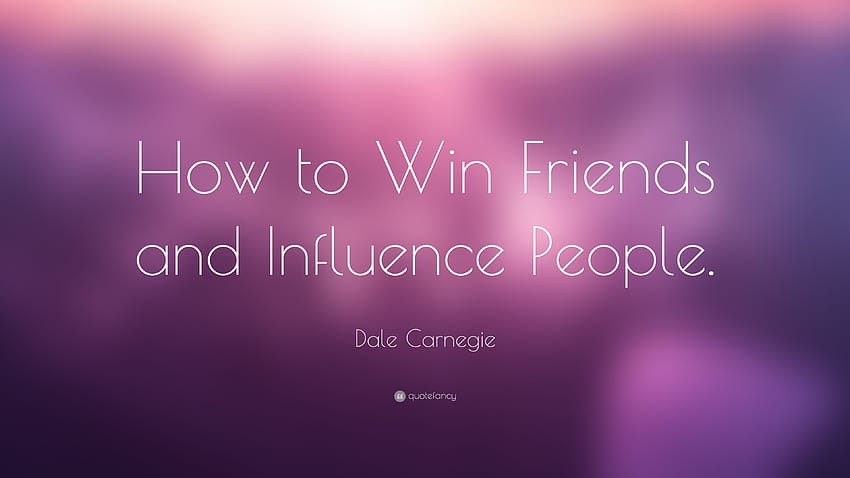Introduction
In the realm of self-help literature, few books have stood the test of time as effectively as Dale Carnegie’s “How to Win Friends and Influence People.” First published in 1936, this iconic book has sold millions of copies worldwide and continues to be relevant in the modern era. Offering practical advice and timeless principles, Carnegie’s work provides invaluable guidance for developing meaningful relationships, enhancing communication skills, and achieving success both personally and professionally. In this article, we delve into the key themes and principles that make this book a classic and explore its lasting impact.
Building Relationships through Empathy and Understanding :
At the core of Carnegie’s philosophy lies the belief that effective interpersonal skills are essential for success. He emphasizes the importance of empathetic understanding, asserting that genuine interest in others and their perspectives forms the foundation of strong relationships. Carnegie advocates active listening, acknowledging that people appreciate being heard and understood. By paying attention to others and demonstrating sincere empathy, we can create a favorable environment for mutual respect and collaboration.
Check the book –> How to Win Friends and Influence People
The Power of Positive Communication
Carnegie’s book emphasizes the transformative power of positive communication. He encourages readers to cultivate a friendly and approachable demeanor, as well as to express appreciation and praise sincerely. By focusing on others’ strengths and accomplishments, we can foster goodwill and inspire individuals to reach their full potential. Carnegie highlights the significance of remembering names and employing them in conversations, as it conveys a sense of respect and personal connection.
Resolving Conflicts and Handling Criticism
Conflict is an inevitable part of human interactions. Carnegie provides practical strategies for resolving disagreements and diffusing tension while maintaining healthy relationships. He advocates avoiding arguments and instead seeking common ground through open and respectful dialogue. Criticism, too, can be a delicate issue, and Carnegie advises offering constructive feedback that emphasizes improvement rather than dwelling on mistakes.
Leadership and Influencing Others
Carnegie’s book also offers insights into effective leadership and influence. He stresses the importance of inspiring others rather than exerting authority through coercion. By empowering individuals and acknowledging their contributions, leaders can create a motivated and productive team. Carnegie’s principles extend to negotiation techniques, highlighting the value of finding mutually beneficial solutions rather than adopting a win-lose mentality.
The Timeless Relevance of Carnegie’s Principles
Although published decades ago, the principles outlined in “How to Win Friends and Influence People” remain pertinent today. In an era of technological advancements, these timeless strategies for meaningful human connection have become even more essential. Whether in personal relationships, professional settings, or social interactions, the principles of empathy, positive communication, conflict resolution, and leadership continue to hold value.
Unlocking Personal and Professional Success
The impact of “How to Win Friends and Influence People” extends far beyond improving social interactions. The principles outlined by Carnegie have far-reaching implications for personal and professional success. By mastering the art of building relationships and understanding others, individuals can enhance their networking abilities, negotiate more effectively, and create a positive work environment. These skills are especially valuable for leaders and aspiring professionals who aim to inspire and motivate others. Carnegie’s teachings equip individuals with the tools needed to navigate the complexities of the business world, fostering collaboration, and fostering a culture of mutual respect.
Application in the Digital Age
In today’s digital age, where virtual interactions and social media dominate, the lessons from Carnegie’s book are more relevant than ever. The convenience of technology should not undermine the importance of genuine human connection. By employing Carnegie’s principles, individuals can break through the barriers of screens and foster meaningful relationships even in virtual spaces. Active listening, expressing appreciation, and displaying empathy are still crucial components of effective communication, regardless of the medium. Moreover, the book reminds us to be mindful of our online presence and to use digital platforms as tools for building connections, rather than isolating ourselves. Carnegie’s insights provide a timeless framework for navigating the complexities of our digital age while maintaining the human touch.
Continued Popularity and Enduring Legacy
The enduring popularity of “How to Win Friends and Influence People” can be attributed to its practicality and relevance across generations. Carnegie’s insights have stood the test of time and continue to resonate with readers worldwide. The book’s enduring legacy is evident in its influence on subsequent self-help literature and leadership development programs. Countless individuals credit Carnegie’s principles with transforming their personal and professional lives. As long as the desire for genuine human connection and the pursuit of success remain integral to the human experience, Carnegie’s wisdom will continue to guide and inspire individuals seeking to make a positive impact in their lives and the lives of others.
Final Thoughts
Dale Carnegie’s “How to Win Friends and Influence People” remains a beacon of wisdom in the self-help genre. Its teachings transcend time, offering practical strategies for building relationships, enhancing communication skills, and achieving personal and professional success. In a world that often prioritizes technology and individualism, Carnegie’s principles remind us of the enduring power of human connection, empathy, and understanding. By embracing these principles, we can navigate the complexities of our modern era with grace, influencing positive change and cultivating a world where genuine connections and meaningful relationships thrive.
